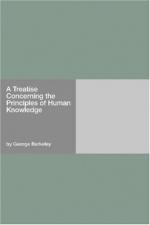71. In answer to this, I observe that, as the notion of Matter is here stated, the question is no longer concerning the existence of a thing distinct from Spirit and idea, from perceiving and being perceived; but whether there are not certain ideas of I know not what sort, in the mind of God which are so many marks or notes that direct Him how to produce sensations in our minds in a constant and regular method—much after the same manner as a musician is directed by the notes of music to produce that harmonious train and composition of sound which is called a tune, though they who hear the music do not perceive the notes, and may be entirely ignorant of them. But, this notion of Matter seems too extravagant to deserve a confutation. Besides, it is in effect no objection against what we have advanced, viz. that there is no senseless unperceived substance.
72. The order of our perceptions shows the goodness of god, but affords no proof of the existence of matter.—If we follow the light of reason, we shall, from the constant uniform method of our sensations, collect the goodness and wisdom of the Spirit who excites them in our minds; but this is all that I can see reasonably concluded from thence. To me, I say, it is evident that the being of a spirit infinitely wise, good, and powerful is abundantly sufficient to explain all the appearances of nature. But, as for inert, senseless Matter, nothing that I perceive has any the least connexion with it, or leads to the thoughts of it. And I would fain see any one explain any the meanest phenomenon in nature by it, or show any manner of reason, though in the lowest rank of probability, that he can have for its existence, or even make any tolerable sense or meaning of that supposition. For, as to its being an occasion, we have, I think, evidently shown that with regard to us it is no occasion. It remains therefore that it must be, if at all, the occasion to God of exciting ideas in us; and what this amounts to we have just now seen.
73. It is worth while to reflect a little on the motives which induced men to suppose the existence of material substance; that so having observed the gradual ceasing and expiration of those motives or reasons, we may proportionably withdraw the assent that was grounded on them. First, therefore, it was thought that colour, figure, motion, and the rest of the sensible qualities or accidents, did really exist without the mind; and for this reason it seemed needful to suppose some unthinking substratum or substance wherein they did exist, since they could not be conceived to exist by themselves. Afterwards, in process of time, men being convinced that colours, sounds, and the rest of the sensible, secondary qualities had no existence without the mind, they stripped this substratum or material substance of those qualities,




